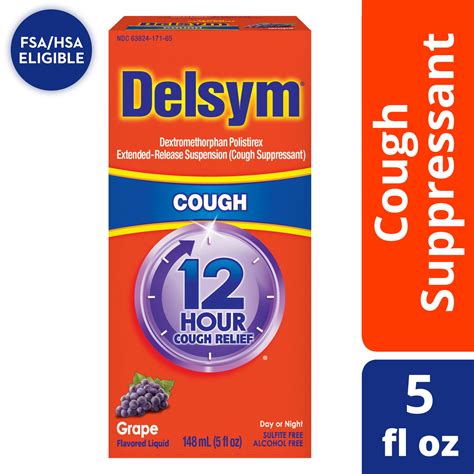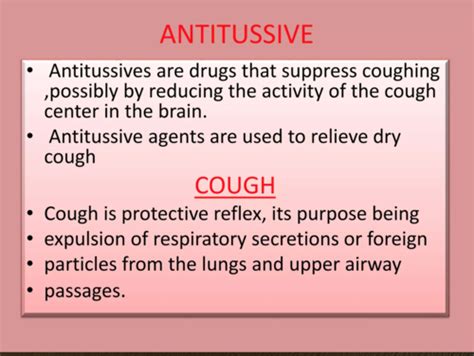Intro
Discover the best cough suppressant medicine to relieve dry, persistent coughs. Explore effective over-the-counter and prescription options, including expectorants and antitussives, to soothe sore throats and calm coughs.
Coughing is a natural reflex that helps to clear the airways of irritants, but when it becomes persistent and disruptive, it can be distressing and affect daily life. Whether it's a dry, hacking cough or a wet, productive cough, finding the right cough suppressant medicine can provide much-needed relief. With so many options available over-the-counter (OTC) and by prescription, it's essential to understand the different types of coughs, the ingredients in cough medicines, and how to choose the best cough suppressant for your specific needs.
Coughs can be broadly classified into two categories: acute and chronic. Acute coughs are typically caused by a viral infection, such as a cold or flu, and usually resolve on their own within a week or two. Chronic coughs, on the other hand, persist for more than eight weeks and can be caused by a variety of factors, including allergies, asthma, gastroesophageal reflux disease (GERD), and environmental irritants. Understanding the underlying cause of your cough is crucial in selecting the most effective treatment.
When it comes to cough suppressant medicines, there are several ingredients to look out for. Dextromethorphan (DM) is a common active ingredient in OTC cough medicines that helps to suppress the cough reflex. Codeine is another cough suppressant that is available by prescription and is often used for more severe, persistent coughs. Other ingredients, such as guaifenesin, help to thin and loosen mucus, making it easier to cough up. Antihistamines, such as diphenhydramine, can also be effective in relieving coughs caused by allergies.
Types of Cough Suppressant Medicines

- Cough drops and lozenges: These provide a soothing, protective barrier for the throat and can help to temporarily relieve coughs.
- Syrups and liquids: These are often used to relieve coughs in children and can be more effective than tablets or capsules.
- Tablets and capsules: These are commonly used to relieve coughs in adults and can be more convenient than syrups or liquids.
- Inhalers: These are used to deliver medication directly to the lungs and can be effective for coughs caused by asthma or chronic obstructive pulmonary disease (COPD).
Benefits of Cough Suppressant Medicines
Cough suppressant medicines can provide several benefits, including: * Relief from persistent and disruptive coughing * Improved sleep quality * Reduced fatigue and stress * Increased productivity and ability to perform daily activities * Relief from accompanying symptoms, such as sore throat and congestionHow to Choose the Best Cough Suppressant Medicine

- Identify the underlying cause of your cough: This will help you to select a medicine that is specifically designed to address your symptoms.
- Read and follow the label instructions: Make sure to follow the recommended dosage and any warnings or precautions.
- Consider your age and health status: Some cough medicines may not be suitable for certain age groups or individuals with certain health conditions.
- Look for medicines that are specifically designed for your type of cough: For example, if you have a dry, hacking cough, look for a medicine that is designed to relieve dry coughs.
Common Ingredients in Cough Suppressant Medicines
Some common ingredients in cough suppressant medicines include: * Dextromethorphan (DM): A cough suppressant that helps to relieve coughs by reducing the activity of the brain's cough center. * Codeine: A prescription cough suppressant that is often used for more severe, persistent coughs. * Guaifenesin: An expectorant that helps to thin and loosen mucus, making it easier to cough up. * Diphenhydramine: An antihistamine that can help to relieve coughs caused by allergies.Practical Examples and Statistical Data

- Robitussin DM: A cough syrup that contains dextromethorphan and guaifenesin to relieve coughs and thin mucus.
- Mucinex: A cough medicine that contains guaifenesin to help thin and loosen mucus.
- Benadryl: An antihistamine that can help to relieve coughs caused by allergies.
Steps to Relieve Coughs Naturally
In addition to using cough suppressant medicines, there are several steps you can take to relieve coughs naturally. These include: * Staying hydrated by drinking plenty of fluids, such as water, tea, and soup. * Using a humidifier to add moisture to the air and relieve dryness. * Avoiding irritants, such as smoke and pollution. * Getting plenty of rest and avoiding strenuous activities.Conclusion and Final Thoughts

Final Recommendations
Some final recommendations for relieving coughs include: * Consulting with your doctor or healthcare professional to determine the underlying cause of your cough. * Using cough suppressant medicines as directed and only when necessary. * Taking steps to relieve coughs naturally, such as staying hydrated and avoiding irritants. * Getting plenty of rest and avoiding strenuous activities.What is the best cough suppressant medicine for a dry, hacking cough?
+A cough syrup that contains dextromethorphan, such as Robitussin DM, can be effective in relieving dry, hacking coughs.
Can I use a cough suppressant medicine if I have a persistent cough?
+Yes, but it's essential to consult with your doctor or healthcare professional to determine the underlying cause of your cough and to ensure that you're using the right medication.
How long should I use a cough suppressant medicine?
+It's generally recommended to use a cough suppressant medicine only when necessary and for the shortest duration possible. Always follow the label instructions and consult with your doctor or healthcare professional if you have any questions or concerns.
We hope this article has provided you with valuable information and insights into the world of cough suppressant medicines. Whether you're looking to relieve a persistent cough or simply want to learn more about the different types of cough medicines available, we encourage you to share this article with others and to take the first step towards improving your overall health. If you have any questions or comments, please don't hesitate to reach out to us. We're always here to help.
